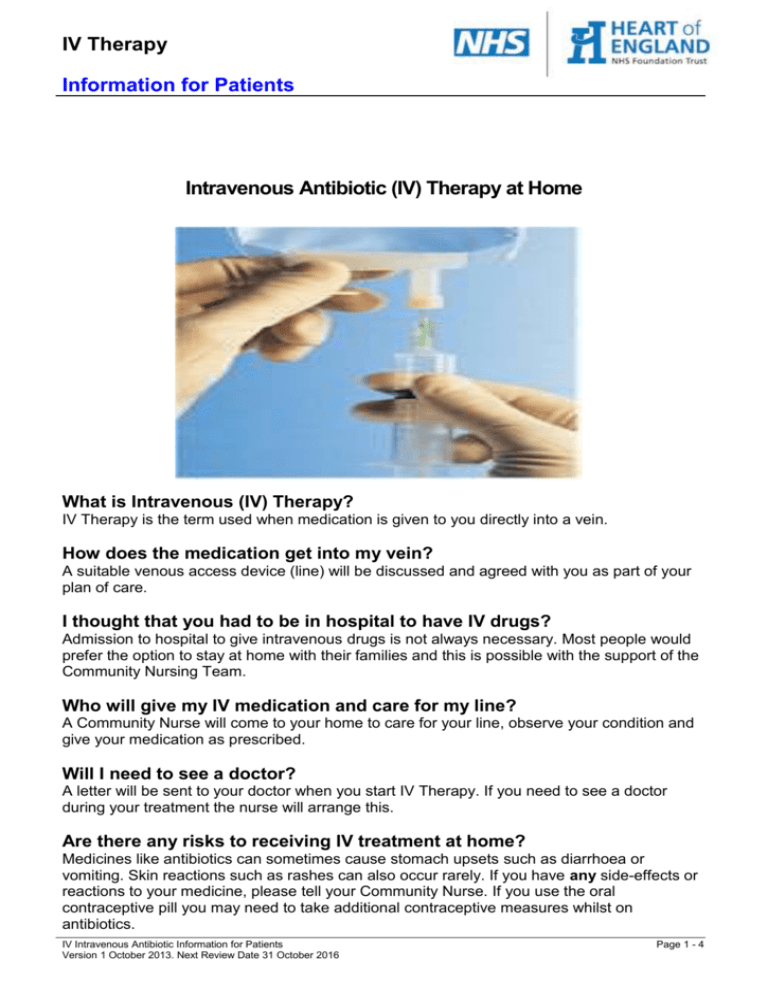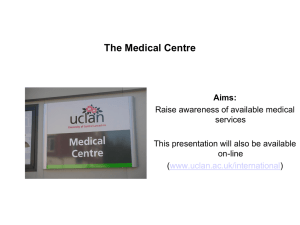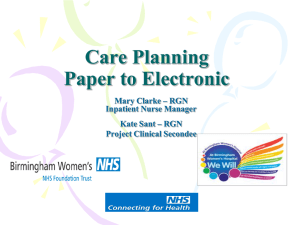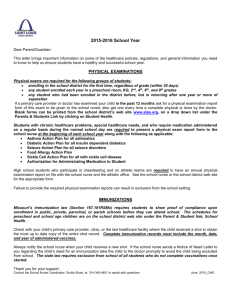IV Antibiotics at Home Leaflet
advertisement

IV Therapy Information for Patients Intravenous Antibiotic (IV) Therapy at Home What is Intravenous (IV) Therapy? IV Therapy is the term used when medication is given to you directly into a vein. How does the medication get into my vein? A suitable venous access device (line) will be discussed and agreed with you as part of your plan of care. I thought that you had to be in hospital to have IV drugs? Admission to hospital to give intravenous drugs is not always necessary. Most people would prefer the option to stay at home with their families and this is possible with the support of the Community Nursing Team. Who will give my IV medication and care for my line? A Community Nurse will come to your home to care for your line, observe your condition and give your medication as prescribed. Will I need to see a doctor? A letter will be sent to your doctor when you start IV Therapy. If you need to see a doctor during your treatment the nurse will arrange this. Are there any risks to receiving IV treatment at home? Medicines like antibiotics can sometimes cause stomach upsets such as diarrhoea or vomiting. Skin reactions such as rashes can also occur rarely. If you have any side-effects or reactions to your medicine, please tell your Community Nurse. If you use the oral contraceptive pill you may need to take additional contraceptive measures whilst on antibiotics. IV Intravenous Antibiotic Information for Patients Version 1 October 2013. Next Review Date 31 October 2016 Page 1 - 4 Information for Patients Anaphylaxis, although rare, is a severe allergic reaction to a substance which your body perceives as a threat. Severe reactions to IV drugs happen to about 1 person in every 15,000 per year. Symptoms often occur within minutes of exposure to the drug, but sometimes after hours. They include: Generalised flushing of the skin Nettle rash (hives) anywhere on the body Swelling of the throat and mouth Difficulty in swallowing or speaking Alterations in heart rate Severe asthma Nausea and vomiting Sudden weakness or floppiness Any of these symptoms are signs of a serious reaction. Dial 999 immediately. Some antibiotics have specific side effects. We have indicated any relevant to you in the list below. If you experience these symptoms you should alert your community nurse. For further information on your antibiotics regarding side effects please refer to the instruction leaflet enclosed within your medication package. Specific side effects to selected oral antibiotics are listed below: Rifampicin - tiredness, headaches, colouring of urine/sweat/tears. If you take warfarin the INR should be checked more frequently. Daptomycin - muscle aches, tenderness, weakness or muscle cramps What if I feel unwell? If the following symptoms occur, phone your Community Nurse for advice and further assessment: If you begin to feel unwell with fever, shivering, vomiting, shortness of breath, or dizziness If the area around the cannula feels hot, swollen or painful You may need to be referred to hospital for further treatment. Do not hesitate to contact your Community Nurse at any time if you are in any doubt about any aspect of your treatment. What will happen at the end of my treatment? A nurse or doctor will remove the line when your course of IV treatment is finished. A dry sterile dressing will be applied, which you can remove after 24 hours. A letter will be sent to your doctor to say that your course of IV treatment has finished. What happens if I am admitted to hospital whist I am on treatment? Please bring any medication supplied for your home IV’s into hospital with you to minimize waste and highlight any fridge items to your ward nurse IV Intravenous Antibiotic Information for Patients Version 1 October 2013. Next Review Date 31 October 2016 Page 2 - 4 Information for Patients What if I need to speak to someone? In the event of emergencies related to your IV therapy, or questions related to visits (e.g. to inform your nurse of a change of time) please contact the community teams on the appropriate number: Birmingham Patients Solihull Patients South Staffordshire patients 0300 555 1919 option 2 (24 hours) 0121 424 5666 (24 hours) 01827 263884 (24 hours) For specific questions relating to your treatment plan and outpatient follow up our infection clinical nurse specialists are available 9am-5pm Monday to Friday on 07811 243298 Or 0121 424 2175 Our commitment to confidentiality We keep personal and clinical information about you to ensure you receive appropriate care and treatment. Everyone working in the NHS has a legal duty to keep information about you confidential. We will share information with other parts of the NHS to support your healthcare needs, and we will inform your GP of your progress unless you ask us not to. If we need to share information that identifies you with other organisations we will ask for your consent. You can help us by pointing out any information in your records which is wrong or needs updating. Additional Sources of Information: Go online and view NHS Choices website for more information about a wide range of health topics http://www.nhs.uk/Pages/HomePage.aspx You may want to visit one of our Health Information Centres located in: Main Entrance at Birmingham Heartlands Hospital Tel: 0121 424 2280 Treatment Centre at Good Hope Hospital Tel: 0121 424 9946 or contact us by email: healthinfo.centre@heartofengland.nhs.uk. Dear Patient We welcome your views on what you liked and suggestions for how things could be improved at this hospital. If you would like to tell us and others about your experience please make your comments through one of the following sites: NHS Choice:Patient Opinion:I want great care:doctor) www.nhs.uk www.patientopinion.org.uk www.iwantgreatcare.org (Here you can leave feedback about your IV Intravenous Antibiotic Information for Patients Version 1 October 2013. Next Review Date 31 October 2016 Page 3 - 4 Information for Patients Be helpful and respectful: think about what people might want to know about this hospital or how your experiences might benefit others. Remember your words must be polite and respectful, and you cannot name individuals on the NHS Choice or Patient Opinion sites. If you have any questions you may want to ask about your condition or treatment, or anything you do not understand or wish to know more about, write them down and your doctor will be more than happy to try and answer them for you. IV Intravenous Antibiotic Information for Patients Version 1 October 2013. Next Review Date 31 October 2016 Page 4 - 4








